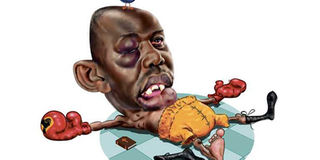Murkomen yaps himself out of majority seat

Kipchumba Murkomen has had a Cinderella run into the Senate, rising to the House top leadership at the age of 39. ILLUSTRATION | JOHN NYAGAH | NATION MEDIA GROUP
What you need to know:
- His stewardship of the Senate, just like his political career, has been characterised by doses of doublespeak, ethnic jingoism and crying wolf.
- Loud on matters of corruption involving others, he has recoiled whenever it has emerged that the four fingers are pointing at him.
Within the circles of the Kalenjin political elite, Kipchumba Murkomen, the Elgeyo-Marakwet senator, is usually referred to as the “deputy doyen”.
If you consider that the title of doyen is reserved for Deputy President William Ruto, the region’s political kingpin, you get an idea of the senator’s place in the politically restive region of the Rift Valley.
One can’t fail to appreciate the high esteem in which he is held, his innumerable political gaffes notwithstanding.
In our political context, doyens are no ordinary mortals. They are perceived imperious tin gods to be venerated and worshipped by their communities, and this could largely explain Murkomen’s recent conduct, characterised by this funny excitement of exploiting every opportunity that comes his way to challenge the president to some kind of physical, bare-knuckled confrontation.
It reminds one of that little bird, Nza, in Chinua Achebe’s Things Fall Apart, which after a heavy meal challenged the gods to a duel.
As a deputy doyen, there is nothing untoward about Murkomen’s challenging the President to a duel. After all, Kenya’s politics is, oftentimes, defined by ethnic power brokers.
Using every opportunity to take on the president is no aberration. It is a fashionable game of power that doyens have so expertly designed as a way of controlling or maintaining power. It is all about being ahead of the pack.
OKONDO'S HUBRIS
This explains why he has reduced every political pronouncement he makes to something akin to a shouting match, especially where President Kenyatta is involved.
It may also explain his metamorphosis from lecture halls into a haughty, combative politician, whose style of abrasive politics knows neither limits nor restraint.
After daring for so long, the president called the bluff. Kicking and punching the air, Murkomen shouted himself out of the office of the leader of the majority on Tuesday in a manner that had echoes to circumstances that led to the downfall of Peter Okondo 30 years ago.
Then-MP for Busia South in what is today Budalang’i constituency, Okondo was a long-serving member of Daniel arap Moi’s Cabinet.
But his reign unexpectedly ended in August 1990 as a result of his loose tongue that had defined his solid political career.
A Kanu hawk to the core, he had warned Bishop Alexander Muge not to set foot in Busia, in what was a plot to secure the then Busia district from the clamour for multiparty politics by the Opposition. He warned the prelate that he risked death if he defied his warning.
The man of the cloth took Okondo’s challenge and made a triumphant visit, only, as Okondo had predicted, to die on his way back to Eldoret.
Okondo resigned, going into political oblivion he would never return from.
POOR LEADERSHIP
Even to the most apolitical, the deputy doyen’s ejection from the majority leader’s seat was all coming on the account of Murkomen’s razor-sharp tongue, which has become more animated since the March 9, 2018 Handshake between President Kenyatta and ODM leader Raila Odinga.
Right from his debut in elective politics in 2013, Murkomen has had a Cinderella run into the Senate, rising to the House top leadership at the age of 39.
It took the elevation of Charles Keter, then-Kericho senator, to the Cabinet for Murkomen’s political career to start rising.
Until his elevation in 2015, Keter was the deputy leader of majority, a void that was quickly filled by the Elgeyo-Marakwet senator, who went further to assume the leadership after the 2017 hotly contested election.
Loud and vociferous, Murkomen’s legacy as the leader of the House will be defined by the recklessness of his tongue.
Even though he started off as a legal scholar, he has never distinguished himself in matters of law.
His stewardship of the Senate, just like his political career, has been characterised by doses of doublespeak, ethnic jingoism and crying wolf, whenever he has been caught in an unfamiliar territory.
The poster image one gets of him is that of an individual who speaks endlessly, dominating conversations and hardly allowing others to speak. It is not just that he is a bad listener, he shouts his way through such conversations.
PETITION
The few times he has donned his gown to practise his trade, he has found himself out of place, like when late last year, Anti-Corruption Court Magistrate Douglas Ogoti summarily dismissed his understanding of the court process.
Murkomen had made a rare appearance in court to defend Nairobi Governor Mike Sonko over corruption allegations.
“I know you don’t practise in our courts,” Mr Ogoti said when he insisted on explaining why he had to ferry a sick Sonko to court for a bail hearing application.
“You didn’t have to disturb a sick person from the hospital. I still would have gone ahead and given directions so your fears were unfounded.”
In 2017, during the first presidential petition in the Supreme Court, Murkomen routinely donned his gown and found his way into the courtroom, where he maintained a studious silence, occasionally pulling out his phone to tweet and take selfies as his colleagues engaged in legal arguments.
Loud on matters of corruption involving others, he has recoiled whenever it has emerged that the four fingers are pointing at him.
He never extricated convincingly when his law firm was one of those identified for wrongdoing in the series of financial scandals that rocked the National Youth Service or even during the Kimwarer and Arror dams scandal.




